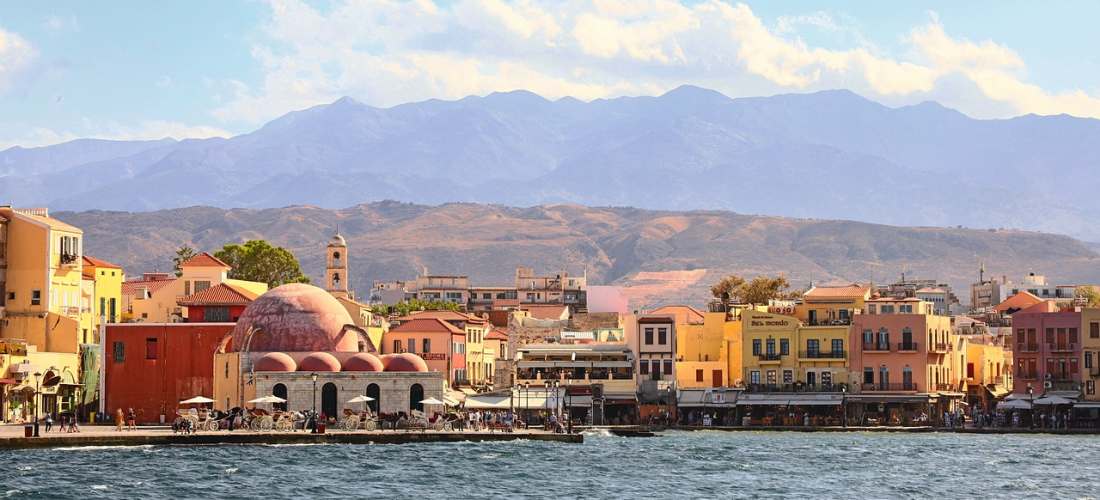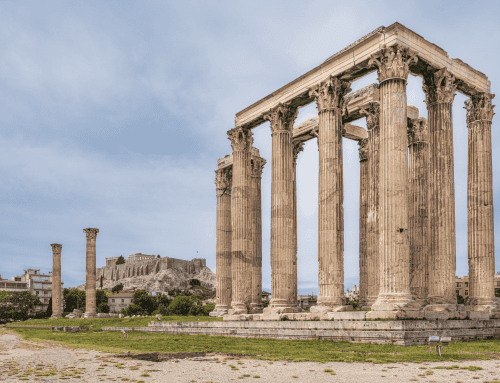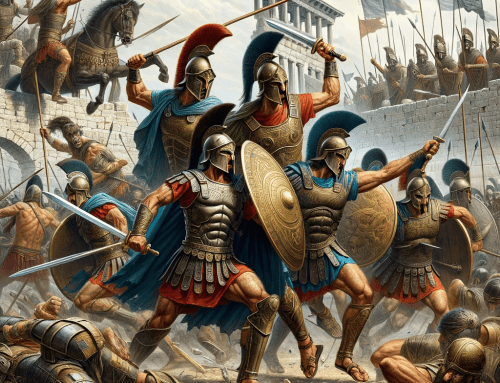40 Interesting Facts about Greece!
Greece is a country brimming with fascinating tales, traditions, and trivia. Here are some interesting facts about Greece to pique your curiosity:
- Cradle of Democracy: Athens, the capital city of Greece, is universally hailed as the birthplace of democracy. It was here, in the 5th century BC, that the system of governance wherein citizens have a direct say in governmental decisions, was established. This democratic model, originating from the Greek word ‘dēmokratia’ (rule by the people), has influenced political structures worldwide.
- Philosophical Pioneers: Greece’s philosophical landscape is dotted with luminaries like Socrates, Plato, and Aristotle. These thinkers challenged societal norms and laid the foundation for Western philosophical discourse. Their teachings on ethics, politics, and metaphysics remain influential to this day.
- Olympic Origins: The ancient Olympic Games began in Olympia in 776 BC. Unlike the multi-sport international event of today, it initially comprised a single foot race. Over time, it grew in stature and significance, fostering peace and unity among warring Greek city-states.
- Greece’s Expansive Coastline: Greece boasts a sprawling coastline stretching over 13,676 kilometers, making it the 11th longest globally. This vast coastline, studded with picturesque ports and harbors, has historically facilitated trade and cultural exchanges.
- Island Galore: Of Greece’s approximately 6,000 islands, only 227 are inhabited. Islands like Crete, Mykonos, and Santorini are not only tourist hotspots but also repositories of ancient artifacts, legends, and architectural marvels.
- The Theatrical Tradition: In Athens stands the world’s earliest known theater, the Theater of Dionysus. Here, legendary playwrights like Sophocles and Aristophanes presented their iconic plays, laying the foundation for dramatic arts globally.
- Maritime Legacy: Greece’s maritime prowess is reflected in its vast merchant navy, ranked third globally in total tonnage. Historically, this naval strength bolstered Greece’s economic and geopolitical influence in the Mediterranean.
- A Unique Alphabet: The Greek alphabet, developed around the 9th century BC, evolved from the Phoenician script. It has not only given the world seminal literary and scientific works but also influenced various modern scripts, especially Latin.
- Byzantine Empire’s Grandeur: The Byzantine Empire, with Constantinople (modern-day Istanbul) as its capital, persisted from the decline of the Western Roman Empire in the 5th century AD until 1453. It melded Greek and Roman cultures, producing magnificent art, architecture, and scholarship.
- Feta Cheese’s Popularity: Feta cheese, a brined curd product, has ancient origins in Greece. Renowned for its tangy taste and crumbly texture, feta forms an integral part of Mediterranean cuisine, particularly Greek salads.
- Religious Homogeneity: The Greek Orthodox Church, rooted in Byzantine traditions, plays a central role in Greek society. Approximately 98% of Greeks adhere to this Christian denomination, making Greece one of the most religiously homogeneous countries in Europe.
- The Father of Medicine: Hippocrates, born on the island of Kos around 460 BC, is considered the father of Western medicine. His groundbreaking work separated medicine from superstition, emphasizing natural causes for diseases. The Hippocratic Oath, a guiding ethical code for doctors, is attributed to him.
- Legacy of Mathematics: Pioneering mathematicians like Pythagoras, Euclid, and Archimedes hailed from Greece. Their groundbreaking theories and geometrical postulates form the bedrock of modern mathematical and scientific explorations.
- Mediterranean Diet’s Praise: Characterized by olive oil, fish, fruits, and whole grains, the Greek diet is globally acclaimed for its health benefits. Rich in antioxidants and good fats, it’s linked to longevity and reduced chronic disease risks.
- Mount Olympus’ Mythology: Towering at 2,917 meters, Mount Olympus is Greece’s highest peak. In ancient Greek myths, it was deemed the abode of the Twelve Olympian gods, making it a central feature in numerous legendary tales.
- Greek Language’s Longevity: The Greek language, with its recorded history spanning over 3,500 years, stands as one of the oldest in Europe. It’s not only the medium of classical literature but also the New Testament of the Christian Bible.
- Rich Tapestry of Mythology: Greek mythology, replete with tales of gods, demigods, and heroes, has profoundly influenced Western cultural expressions. From literature and art to movies, these myths continue to captivate and inspire.
- Architectural Marvels: The Parthenon, a temple dedicated to the goddess Athena, stands atop the Acropolis in Athens. Constructed in the 5th century BC, this Doric masterpiece symbolizes ancient Greek architectural and artistic achievements.
- Epic Literary Contributions: Homer’s epics, “The Iliad” and “The Odyssey,” written in the 8th century BC, chronicle the Trojan War and its aftermath. These foundational texts of Western literature have been translated into numerous languages, inspiring countless adaptations and reinterpretations.
- Musical Innovations: The origins of Western musical theory lie in ancient Greece. Pythagoras’ mathematical formulations pertaining to musical intervals laid the groundwork for harmonic and melodic constructs.
- Historical Art Movements: From the geometric patterns of the 9th century BC to the Hellenistic art of the 4th century BC, Greek art has witnessed a diverse range of styles and movements, each reflecting evolving societal dynamics and artistic explorations.
- Remarkable Engineering: The ancient Greeks showcased advanced engineering prowess in structures like the Corinth Canal and inventions like the Antikythera mechanism, an ancient analog computer.
- Astounding Astronomical Insights: Greek astronomers like Aristarchus and Eratosthenes made pioneering contributions, proposing heliocentrism and accurately estimating Earth’s circumference, respectively.
- Heritage of Winemaking: Winemaking in Greece dates back over 4,000 years. Regions like Santorini and Crete produce distinct wines, with indigenous grape varieties like Assyrtiko and Xinomavro enjoying global acclaim.
- Majestic Sculptural Traditions: Greek sculpture, transitioning from rigid ‘kouros’ figures to lifelike statues like ‘Venus de Milo,’ showcases the evolution of artistic techniques and human representation.
- Macedonia’s Conquests: Under Alexander the Great, the Kingdom of Macedonia expanded its territories, forging one of history’s largest empires. This conquest facilitated cultural exchanges, ushering in the Hellenistic era.
- Coffee’s Societal Role: Greek coffee culture is emblematic of the nation’s social fabric. Traditional ‘kafeneio’ serve not just beverages but also foster community interactions, facilitating debates and discussions.
- Significance of Name Days: Celebrating ‘name days’ associated with saints is a revered Greek tradition, often overshadowing birthdays. This highlights Greece’s entrenched Christian values and practices.
- Olive Trees’ Timelessness: Some Greek olive trees, believed to be millennia-old, continue to bear fruit. These ancient trees symbolize Greece’s resilience and the enduring relevance of its agrarian heritage.
- World Heritage Galore: Greece is home to 18 UNESCO World Heritage sites, underscoring its multifaceted historical, architectural, and natural splendors.
- Cycladic Architectural Charm: The Cycladic islands, with their quintessential blue and white edifices, offer a visual treat. These structures, harmonizing with the cerulean skies and seas, encapsulate Greek island aesthetics.
- Santorini’s Volcanic Legacy: Santorini’s breathtaking landscapes owe their existence to volcanic eruptions. This geological history lends the island’s beaches their distinctive red, black, and white sands.
- Epidaurus’ Therapeutic History: The Sanctuary of Asklepios at Epidaurus was an ancient therapeutic center. Dedicated to the god of healing, it attracted individuals seeking cures for various ailments, attesting to ancient Greece’s medical advancements.
- Geometry’s Greek Foundations: Works like Euclid’s “Elements” have indelibly shaped the domain of geometry. These texts, emphasizing logical proofs and postulates, served as seminal mathematical references for centuries.
- Sparta’s Distinctive Heritage: Sparta’s societal structure, emphasizing military training and communal living, set it apart from other Greek city-states. Its rigorous educational and training regimens have garnered historical and cinematic attention.
- Delphic Oracle’s Mystique: Nestled on Mount Parnassus, the Delphic Oracle was ancient Greece’s foremost religious sanctuary. Devoted to Apollo, it was believed that the god conveyed prophecies through the resident priestess, the Pythia.
- Festive Greek Vibrancy: Greece’s calendar is peppered with festivals celebrating its rich cultural, religious, and culinary heritage. These events, ranging from the Dionysia to the Thessaloniki Film Festival, draw locals and tourists alike.
- Evzones’ Ceremonial Role: The Evzones, distinguished by their pleated skirts and pompom shoes, are elite presidential guards. Their changing of the guard ceremony in Athens is a riveting spectacle, embodying Greek military traditions.
- Melissani Cave’s Splendor: Kefalonia’s Melissani Cave conceals a subterranean lake. When sunlight filters in, the water’s azure hue, complemented by the cave’s geological formations, creates a surreal visual experience.
- Easter’s Unique Greek Flavor: Easter celebrations in Greece are unparalleled in their grandeur. Marked by candlelit processions, fireworks, and sumptuous feasts, they offer a deep dive into Greece’s Christian rituals and communal spirit.







